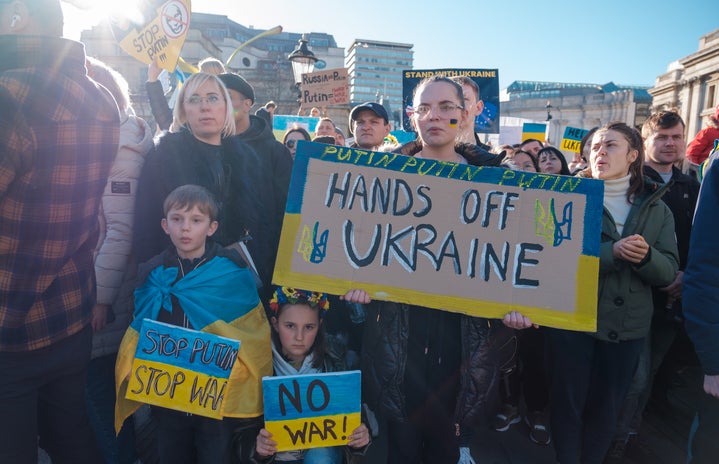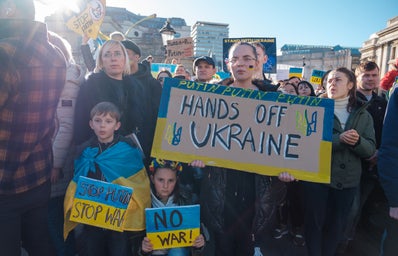For more information on the Russian invasion of Ukraine and other news on the country, see BBC, Al Jazeera and/or The New York Times
Donate to Ukraine (for Canadians)
Russia’s invasion of Ukraine has had a cataclysmic effect on the world, both physically and ideologically alike. As Ukrainian families are dispersed and their sovereign land is intruded on by a domineering foreign army, the news has been –– and understandably so –– a consistent reel of updates and insights regarding the geopolitical crisis. The war is profound for a variety of reasons, from it reinvigorating Cold War sentiments of the United States against Russia to how it is on European land (the latter point shedding light on the fabricated nature of Euro-centrist thought). As a distant onlooker of the war, I cannot fathom the pain and devastation of those in Ukraine whose lives have dramatically changed in the last weeks, better yet those in Canada with family in the nation who feel helpless in the face of gruelling warfare abroad.
The looming dread of war is frightening and almost sublime in its unthinkable nature, especially for younger generations who have not confronted war either in one’s direct life or in the media. The sheer violence of it is not only terrifying, but absurd; isn’t it more rational for socioeconomic matters to be mended through discussion versus large-scale violence? I posit that war’s absurdity is what makes Gen Z turn to humour and meme culture to unpack fears surrounding it. Problematic? Insensitive? Of bad taste? Probably. But it is true that while Ukraine’s infrastructure disintegrates, a teenager in California is tweeting about the song they will listen to on the frontlines if they were drafted.
Humour as a mechanism to discuss the war is often frowned upon but there comes in mind another form of coping that I would argue can be just ill-chosen, although is more accepted: the desire to see the war turned into a film. Many on social media have expressed wishes to see Jeremy Renner play Ukraine’s president President Zelensky and for couples who have joined Ukraine’s army together to be the subject of Hollywood romance movies. Consumers and media figures, while the invasion has only just begun, are already fawning over potential adaptations of the Russia-Ukraine crisis that will prevail on their Netflix to-watch list.
As someone who enjoys a ton of war movies –– 1917, Apocalypse Now, Full Metal Jacket and Come and See to name a few — I do not dispute the idea that war is a fascinating subject to display in a cinematic lens or in art at large. Considering prolific war novels Catch 22 and Slaughterhouse Five and the representations of war in paintings from Turner to Picasso, the ordeal of war, which has transpired since early human history, is bound to take up the human imagination in humanity’s most imaginative endeavour: art. Through representations of war, we can gauge its horror both in its physical damage to land and people, and its lingering psychological doom on civilizations. Art, however, may also reflect another side of war: victory. We can cry at mothers and wives learning that their sons and husbands have died overseas but we can also cry, of joy, when other sons and husbands return home. War is extreme on both ends of the spectrum as eliciting destruction but also a sense of nationalistic pride for its victors (if there really is a victor of war). This range in sentiment is hard to convey in an empirical newspaper article or piece of journalism, so its vast emotional plane may be best shown in an artistic form. It is also important to note that there is a socio-economic angle to the portrayals of war and the military at-large, and that war is shown not only as a topic of earnest artistic interest but for propaganda reasons (see Marvel).
Taking into account how our modern world has grown up interpreting wars through the entertainment industry, the calls for adaptations of Ukraine’s crises are, while in poor taste, not completely banal. The film is a mode in which we are accustomed to learning about historical events, and thus arises the inclination to foreshadow future war movies. But the film is also a fictional medium: we may be able to extract emotional truths about the war vis-a-vis the silver screen, but not complete accuracy. There are, of course, limits to what we can understand about a past political event even through historical documents, but art’s absence of facts is often not out of mere unknowingness but to manipulate the viewer’s psychology. The dangers of film to inspire emotions, and thereby control one’s mindset at-large, is theorized by German-Jewish philosopher Walter Benjamin. Writing during the Nazi regime, his essay “The Work of Art in the Age of Mechanical Reproduction” contends that “even in the most perfect reproduction, one thing is lacking: the here and now of the work of art.” Art is inherently passive, unable to reflect a current, moving event but can only be used to retroactively portray an image. This fact is intermingled with the “desire of the present-day masses to “get closer”to things spatially […] passionate concerns for overcoming each things uniqueness by assimilating it as a reproduction.” Applying Benjamin’s cautions in a present-day perspective, society’s desire to see Jeremy Renner play Ukraine’s president can be rendered as a mechanism to overcome the apparent uniqueness of the Russian invasion. Imitating war through film may draw us away from the truths of it and instead of comfort us with familiar images of the actors we love, in the artistic medium we love.
It is difficult to assert whether there is a right or wrong way to understand war. The question of how best we learn about it opens up broader discussions of what is the most efficient and sound way to gain knowledge at large. By appealing to emotions? Sticking to the facts? By reading? Watching? Listening? We can, however, reflect on who is controlling the platforms of information that we encounter and what these implications would be. Are we being fed propaganda? Directed to feel a certain emotion, or a view of an event in a specific perspective? It is not necessarily concerning to view art that has sentimental aims and intentions for its consumer, but I believe we must be wary that said art has its intentions for us before, as Benjamin warns, humankind “has reached the point where it can experience its own annihilation as a supreme aesthetic pleasure.” Before revelling in the idea of a future Academy Awards ceremony being endowed with films on Ukraine, remember that it is a present, gruelling matter with lives and families at stake. While art offers us ample perspective on both political and mental issues at large, it should not be used as a distraction from the currency of events, or solely as a means of glorification.


